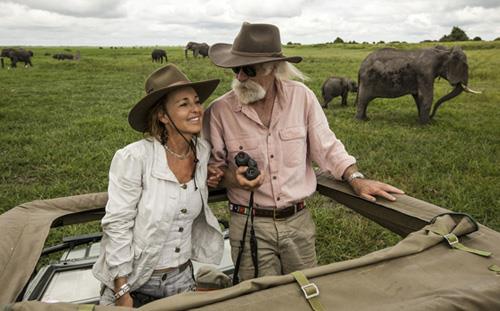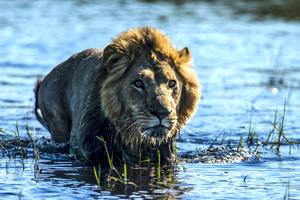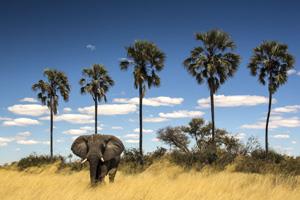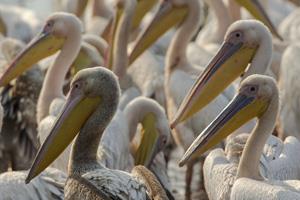
You can see the Okavango Delta from space.
That right there gives you a sense of the sheer scale of the place, and explains why PBS Nature and veteran wildlife filmmakers Dereck Joubert and Beverly Joubert opted not to make a TV program so much as a miniseries — a three-part, three-hour film that will air over consecutive weeks in Nature's regular time period (Wednesdays at 8 p.m. ET, starting Oct. 23, check your local listings).
The Okavango matters because it is one of the last remaining untouched Edens in wild Africa, and it is where married wildlife filmmakers and National Geographic Explorers-in-Residence Beverly and Dereck Joubert have made their home for the better part of 35 years. They were the first filmmakers to record documentary evidence of lions hunting elephants at night. They proved that wild lions can swim, long distances when necessary, and that hyenas and lions harbor a deep, abiding hatred of each other that can last for generations, a hatred of almost Shakespearean proportions.
Their new film, Okavango: River of Dreams — a finalist at last month's Jackson Hole Wildlife Film Festival, the Cannes of wildlife filmmaking — is different, though.
It isn't a story about lion families as much as it is a sweeping view of an entire ecosystem, filmed over a period of four years in one of the most pristine, natural wild areas left on Earth. The Okavango is one of the few major rivers that does not drain out to the sea. It is entirely landlocked; its vast ecosystem is self-contained.
The initial idea, Dereck Joubert told TV Worth Watching by phone last month from New York's Lincoln Center, was that the miniseries would take three years to make — a year for each hour-long episode in the finished program.
Fate has a way of throwing a wrench into the most carefully laid plans, however.
And in this case, fate came in the guise of a hostile, marauding buffalo in the middle of the night. A buffalo gored Dereck Joubert first, then Beverly, with little more than three seconds' warning — an angry grunt — extremely loud and awfully close in the pitch black of an African night.
 Beverly Joubert blacked out, without realizing why, then suddenly to find herself being tossed up and down on a running buffalo's horns through more than a mile of tall grass and thorn bush, before being tossed unceremoniously to the ground like a rag doll, bleeding profusely and fading in and out of consciousness. In near-total darkness, surrounded by the snorting and grunting of agitated buffaloes — the animal the novelist Ernest Hemingway once described as Africa's most dangerous, large, ill-tempered beast — Dereck ran through the bush to reach her and try to keep her alive, all the while radioing frantically for an evacuation by air. There was a chance he wouldn't reach anyone, even with the satellite radio. This is one of the most remote corners of the African wilderness, where rescue can be as much as a day away, even in the modern age of GPS tracking and satellite radio — where two filmmakers, one of them severely injured and near death, were hidden in a wilderness area larger than the state of Massachusetts.
Beverly Joubert blacked out, without realizing why, then suddenly to find herself being tossed up and down on a running buffalo's horns through more than a mile of tall grass and thorn bush, before being tossed unceremoniously to the ground like a rag doll, bleeding profusely and fading in and out of consciousness. In near-total darkness, surrounded by the snorting and grunting of agitated buffaloes — the animal the novelist Ernest Hemingway once described as Africa's most dangerous, large, ill-tempered beast — Dereck ran through the bush to reach her and try to keep her alive, all the while radioing frantically for an evacuation by air. There was a chance he wouldn't reach anyone, even with the satellite radio. This is one of the most remote corners of the African wilderness, where rescue can be as much as a day away, even in the modern age of GPS tracking and satellite radio — where two filmmakers, one of them severely injured and near death, were hidden in a wilderness area larger than the state of Massachusetts.
It's one thing to devote one's life to creating a filmed record of one of the world's last remaining wild places. It's quite another to nearly die for one's passion.
Nearly a year later, speaking from the confines of Lincoln Center — after a life spent in the African wilderness, the Jouberts were late to their interview thanks to the crush of traffic in New York — Beverly Joubert was philosophical about her ordeal.
"At first impact, I was concussed," she said, almost matter-of-factly. "I woke up on his horns, riding the buffalo. As I came around, I thought, 'Oh my (gosh), I'm in a dream, I'm riding an animal,' and then, of course, reality kicked in very quickly."
The pain was like nothing she had ever experienced.
"I probably blacked out because of the intense pain my body was going through."
Dereck, himself bruised from being battered first and tossed aside before the buffalo turned its attention to Beverly Joubert, did what he did. A life in the African bush has made him self-reliant and resourceful, where first aid is concerned, but still — this was a whole other level of medical emergency than he had ever experienced before. He realized quickly that if he did not do something to stop the bleeding, his wife would die.
It would be 11 hours before help would arrive, and it would be several additional hours after that before Beverly Joubert reached a proper emergency hospital.
"I was conscious," she recalled, but that was only half the battle. "It's just that at times I fell asleep. My heart stopped twice through the night, and then once again on the flight out to the emergency room. It took 18 hours to get through."
Dereck admitted he would not have blamed PBS and WNET, the New York affiliate that has produced Naturefor the past 38 years, had they walked away from the film.
There are unforeseen circumstances — and then there's this.
PBS did the opposite, Dereck Joubert said. PBS and Nature's producers at WNET told the Jouberts to take as long as they needed before returning to the wild to complete the film.
No worries, they said. Take your time. Recover properly.
Dereck Joubert said he will be eternally grateful for their understanding. More often, in the cutthroat world of filmmaking, the producing studio would hand off to the insurance company, and that would be it.
Dereck and Beverly Joubert knew, too, that it was important that Beverly fully recover from her injuries before heading back into wild Africa, with its malarial mosquitoes, tick fever, venomous snakes, thunderstorms, lightning strikes, gale-force winds, seasonal flooding, and temperature extremes. Yes, climate change has reached the Okavango Delta, as it has everywhere else: The region has recently recorded record-high temperatures that tipped as high as 50° Celsius (122° Fahrenheit) at times.
And so, a three-year project became a four-year marathon.
The Jouberts have witnessed changes in the Okavango over the years, some subtle, many dramatic.
This is not the first time they have made a nature film there, but this time they wanted to take a broader view, equipped with the latest in digital camera technology and a growing sense of urgency triggered by the worldwide climate crisis.
 Some of the changes are man-made and have nothing to do with climate. This past summer, the government of Botswana lifted a ban on trophy hunting that had been in existence for several decades. The filmmakers, who've spent most of their working lives working in the delta region, dread the thought of what might happen next. In the years when trophy hunting was allowed, they recall the Okavango elephants were nervous and skittish around people and would react in unpredictable ways.
Some of the changes are man-made and have nothing to do with climate. This past summer, the government of Botswana lifted a ban on trophy hunting that had been in existence for several decades. The filmmakers, who've spent most of their working lives working in the delta region, dread the thought of what might happen next. In the years when trophy hunting was allowed, they recall the Okavango elephants were nervous and skittish around people and would react in unpredictable ways.
Trophy hunters insist that hunting generates much-needed foreign exchange for local communities, thanks to costly license fees. They argue that hunting and tourism can co-exist. The Jouberts are not so sure.
The climate crisis and the hunting argument aside, the Jouberts knew, too, that River of Dreams would have to be different if it was to stand out from the glut of other nature programs, and they believe they've succeeded.
Just one example: River of Dreams opens with a surprising choice of music for nature programs — the Eurythmics' Sweet Dreams, as covered by alt-rocker Marilyn Manson. Dereck Joubert said he wanted Sweet Dreams from the beginning because the lyrics illustrate River of Dreams' core message of how life in the Okavango Delta is interconnected, equal parts use and abuse. One of the film's editors suggested the Marilyn Manson version — rough-edged and somewhat eccentric — and Joubert was sold. Convincing "Manson's people" — Joubert's words — might prove a tougher sell, though, he reasoned.
As it turned out, Manson was agreeable, the same way Radiohead's Thom Yorke signed off on his song Bloom for Blue Planet II, and for the same reason: The planet is in trouble, and rock musicians — some of them, anyway — want to do what they can to help get word out.
River of Dreams took a long time to come to fruition, and not just because of that little business with an angry buffalo. The Jouberts prefer to plan their films in advance — "We almost storyboarded it," Beverly said — but nature has a way of throwing unexpected curves, as she found out.
Things don't always go according to plan. That cute lion cub at the beginning of filming might not survive to make it to the film's end.
Dereck Joubert insists they never sanitize events in the editing to make the finished film more palatable to a family audience.
"Reality in life is pure," he said simply, "even though it doesn't always end well."
Dereck Joubert likens their approach to "stepping up to a canvas." The main character in River of Dreams, he said, "is the water."
The film is broken into three distinctive parts — Paradise on Oct. 23, Limbo on Oct. 30, and Inferno on Nov. 6 (check local listings) — because it tells the story of the seasons and how they affect the Okavango over an extended period of time, measured in years and compressed into three hours of screen time.
"It's all back and forth," he said, continuing the canvas analogy. "The final brushstrokes are applied in the editing." Joubert insists they are never tempted to smooth over tragic moments — adolescent cheetah cubs batting a terrified newborn gazelle back and forth before finally killing it, as a way of learning how to hunt, for example, or a visibly distraught mother elephant that has lost its baby to marauding hyenas.
"The answer to that is an emphatic 'no,'" he said. "I think in many ways that by leaving out a scene like that, you lie.
"I don’t think that's morally acceptable. There are ways to present it. One can deal with things philosophically, rather than horrifically. This is a harsh place. Without these episodes of violence in many ways, Africa would not be what it is.
"That's what I love about Africa. It has its ups and downs. It is harsh, but it doesn't judge."
Nature programming is going through dramatic changes, not all of them good, he said.
"There are two trends we've seen lately in wildlife filmmaking. One is to avoid the ugliness altogether and create a pretty version of Africa. And the other is to over-hype it and just show blood and guts. I don't think either is right. I think people want the real story, and that's what we're after — the real story."
"It's not easy for the animals out there," Beverly said. “We're seeing this and capturing it on a daily basis. These animals have their daily struggles of survival.
 "And then, at the end, we bring humankind into the picture. Whether it's encroachment on the animals' habitat, or trophy hunting, or poaching, the illegal form of hunting, we are making it so much harder for them to survive. That is something the audience often doesn't think about. They think, 'Oh, this is nature, and they're in the wild, and it’s easy.' Well, it's not. It's survival."
"And then, at the end, we bring humankind into the picture. Whether it's encroachment on the animals' habitat, or trophy hunting, or poaching, the illegal form of hunting, we are making it so much harder for them to survive. That is something the audience often doesn't think about. They think, 'Oh, this is nature, and they're in the wild, and it’s easy.' Well, it's not. It's survival."
Dereck Joubert says honesty is the key to a nature program that clicks on different levels, intellectual, philosophical, and emotional.
"If nature films — National Geographic and Nature and PBS — if all of these wildlife films were simply about pretty pictures and saying how great the Okavango is, I think we'd all be wasting our time," he said. "What we do is present stories, real stories from the wild, to audiences around the world as parables in many ways, so they can digest, through the lives of other species, the emotions of life and death and birth and transitions. We coax people into thinking about these life moments in a safe way, a way that fortifies them for later on in their own lives when they may have to deal with a family tragedy or a family member dying. What we do in our films allows people to consider that life, in reality, is good and pure, even though it doesn't always end well."
Okavango: River of Dreams debuts Wednesday on PBS Nature at 8 p.m. ET, and concludes Nov. 6. Check local listings for the time in your area.